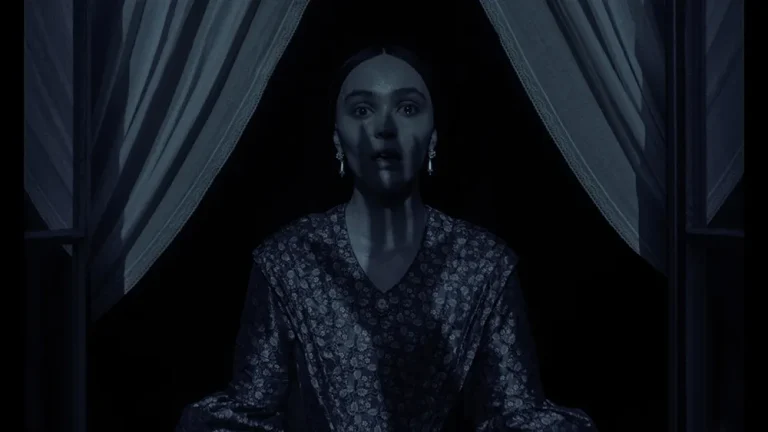The worldwide COVID lockdown period was definitely a devastatingly impactful experience to go through. From crowded hospitals to restrained freedom of movement, the period showed us a world that was nowhere near a normal lifestyle. Diwa Shah’s minimalistic feature, Bahadur the Brave (2023), covers such spaces that go right into the life of two men with different outcomes.
Bahadur the Brave starts with Hansi witnessing a man being punished for breaking the law of lockdown in the middle of the street. What stuns Hansi at that moment is the feeling of guilt as Hansi, too, violates the law. Illegal walks are prohibited as part of the lockdown regulations, and Hansi works as a ‘carry man’ to deliver groceries around town. In Hindi literature, Bahadur carries the meaning of being a brave servant, commonly used as a term by locals to address Nepali helpers.
We see the community rushing into stores to secure their grocery list while Bahadur takes that as his ultimate opportunity to earn. He places a price for the service he delivers, with a hike due to the demand. At this point, the film shows the plight of laborers to gain money through any possible means. This aspect follows the track of the 2022 film Harka by Lotfy Nathan, which portrays the dilemma of laborers. Besides, the situation is such that laborers are also downsized due to the pandemic complications. This further worsens the laborers’ livelihood.
Hansi is not alone among the circle of frustrated laborers. Dil Bahadur, who happens to be Hansi’s brother-in-law, is part of the Nepali workers in the heart of Nainital, India. Dil Bahadur projects a man of integrity through his assertive body language. Younger in age but resilient at his job, Dil Bahadur gives the aura of an individual who knows what he is doing. A call for Dil Bahadur to fill a vacant spot as a construction worker in Haldwani catches the attention of Hansi. The decision-making process of Hansi to acquire more jobs and its outcome summarizes the film’s plot.
One of the highlights of this film is the sneaky ways of Hansi to grab as much money/payment as he can throughout the period. For instance, Hansi stops a man from picking up fallen banknotes on the ground by claiming that the virus infects the notes. In this scene, we can observe the desperation of Hansi to attain money, even if it is not the righteous way. In another scene, Hansi is caught by Dil Bahadur in his hostel room with a bandage around his foot. Hansi claims he has fallen into a ditch while heading to the bus to return to Nepal. However, Hansi starts running steadily upon hearing a work offer being announced from afar.
We can witness the contrasting nature of both men in terms of understanding and responsibility. Dil Bahadur takes care of the needs of Hansi all the time. He devotes his time to Hansi whenever there is a hurdle or a problem. Dil Bahadur is against the negative change within Hansi, which is evident in the scene when Dil Bahadur declines to count Hansi’s money from his cleaning job. Dil Bahadur throws the chunk of banknotes on the ground for Hansi to pick up for lying. Yet, he gradually cools down after joking with Hansi to spot the fool sign on his forehead for accepting his lies. The patience that has structured Hansi and Dil Bahadur has made them take things lightly.
Hansi’s desperation for money originates from the need to pay for his son’s stomach operation back in Nepal. Losing funds due to breaking lockdown rules and the shortage of laborers have made Hansi transform himself indefinitely. However, Hansi’s recklessness in terms of savings and performing his duties has projected him as a man who is not as intellectual as Dil Bahadur. Moreover, Hansi faces difficulties in understanding spoken Hindi while communicating with the villagers. Hansi’s lack of comprehension always ends the conversation on a funnier note. The darker side of this aspect is that it marks Hansi as an unwise person by some in the community.
On the other hand, Dil Bahadur constantly reminds Hansi to be aware of his wife, Shanti ( Dil Bahadur’s sister), who awaits him in Nepal. Hansi’s constant urge to work has stopped him from returning to Nepal to spend time with his family. Therefore, Dil Bahadur seems to be the advisor for Hansi, who understands his desire to live a normal life. Yet, Hansi doesn’t show much of the same concern towards Dil Bahadur at times of need. There’s something that hinders Hansi from sharing his genuine feelings about his behavior.
The sufferings of younger generations are shown in a scene where a Nepali boy constantly asks the officer to allow him to cross the border. “Let’s swim back home,” uttered by the kid to Dil Bahadur along a river on the border, can make us giggle, but it does have a deeper meaning to it. Parents of students expressing their dissatisfaction with the new teaching mode in schools have also raised a red flag. Online classes have made students dislike the syllabus, which burdens their parents to ponder their future.
Bahadur the Brave, which was nominated at the 2023 San Sebastian Film Festival, won the prestigious Kutxabank New Directors Award. Director Diwa Shah delivers a film exquisitely focusing on the condition of Nepali workers and their surrounding community in a restricted state. Her focus on the technicality of COVID complications and less on emotional trajectory has made the film represent multiple core points on survival mechanisms. The labor crisis, the unsafe working conditions of workers, the difficulties of travel, and the border crossover issues are all emphasized promptly in this film. The peculiar stare of Hansi shifts to a different platform at the climax of the film that speaks louder than words. Hansi is, in fact, changed forever.


![Dark Figure of Crime [2019] ‘NYAFF’ Review – A Visceral Crime Drama](https://79468c92.delivery.rocketcdn.me/wp-content/uploads/2019/06/Dark-Figure-of-Crime-2019.jpg)

![Trees of Peace [2022] Netflix Review: A Deeply moving story of Resilience & The Human Spirit](https://79468c92.delivery.rocketcdn.me/wp-content/uploads/2022/06/Trees-of-Peace-2022-768x432.jpg)

